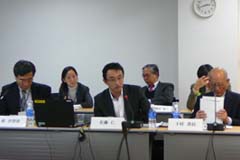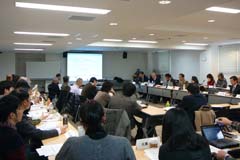JICA-RI Holds First Meeting to Deliberate on the New Research "History of Japan's ODA"
2016.02.02
JICA Research Institute plans to launch a new research on "History of Japan's ODA" with the aim to review Japan's ODA and indicate a new direction.
In 2015, the Sustainable Development Goals (SDGs) were adopted by the UN General Assembly, and the "Development Cooperation Charter" was established by the Japanese cabinet. In the momentum with these new frameworks, JICA will review the origin, accomplishments, roles and reforms of Japan's ODA, with the aim of contributing to quality growth in the future.
The first meeting to discuss the contents of the research was held on January 23, 2016, at JICA Ichigaya Building. The participants included researchers, practitioners and representatives of private companies.

From left, JICA-RI Director Ichiro Tambo,Professor Jin Sato (the University of Tokyo)and Emeritus professor Yasutami Shimomura (Hosei University)
JICA-RI Director Ichiro Tambo kicked off the meeting. Tambo stated the research's emphasis on the perspectives of beneficiaries, both individuals and countries, the perspectives of Japanese citizens and development practitioners, the long-term impacts of large-scale infrastructure projects and the development of human resources. He also mentioned, "This research is not intended to provide an 'official' history of ODA from the point of view of JICA, but will analyze the experiences and roles of ODA with unbiased views of researchers."
Next, Yasutami Shimomura, emeritus professor of Hosei University and expected to write the first volume, introduced the outline of the proposed volume, "History of Japan's Assistance Policies (tentative)." Shimomura said he wants the outcome of the research to serve as a standard reference that is to be cited for years. He wants to "recreate the life-sized reality of Japan's experience in assistance" by verifying common beliefs of Japan's economic cooperation, and by focusing on the aid philosophy and national interests, with political, economic and social changes.
Next, Jin Sato, professor of Institute for Advanced Studies on Asia, the University of Tokyo, explained the aim of the second volume, "Japan's Assistance in global context (tentative)." "The volume will shed light on how the world, in particular beneficiary countries, sees Japan's assistance, what lessons led Japan to provide assistance, and where Japan stands in the global trend in assistance. From there, it will see how Japan should provide assistance." The volume will also include comparative analysis of some regions and countries, look at the convergence and diffusion of aid norms, and study whether the areas Japan considers are its strength coincide with the global view.

Participants engaged in discussion
In the discussion, some acknowledged the importance of recording the history of Japan's ODA. Others pointed out that the research should not merely list ODA events but also include analysis on lessons learned. Also, some recommended to include: sector and region-wide issues, the characteristics and positioning of Japan's ODA in global context, and a variety of players such as private sectors.
A series of meetings will be held at three other cities in Japan to discuss the content of the research. Research will commence by mid-2016, reflecting the opinions of the meeting participants, and is planned to take about five years to complete.
Tambo said, "Japan acquired many lessons as it grew from a beneficiary of international assistance to a provider. This research is important in order to learn from these lessons and make our ODAs better for the world's development. The people who worked to create the ODA system are now increasingly aging, so it is an important responsibility of our generation to keep their memories alive."

事業事前評価表(地球規模課題対応国際科学技術協力(SATREPS)).国際協力機構 地球環境部 . 防災第一チーム. 1.案件名.国 名: フィリピン共和国.

事業事前評価表(地球規模課題対応国際科学技術協力(SATREPS)).国際協力機構 地球環境部 . 防災第一チーム. 1.案件名.国 名: フィリピン共和国.

事業事前評価表(地球規模課題対応国際科学技術協力(SATREPS)).国際協力機構 地球環境部 . 防災第一チーム. 1.案件名.国 名: フィリピン共和国.

事業事前評価表(地球規模課題対応国際科学技術協力(SATREPS)).国際協力機構 地球環境部 . 防災第一チーム. 1.案件名.国 名: フィリピン共和国.

事業事前評価表(地球規模課題対応国際科学技術協力(SATREPS)).国際協力機構 地球環境部 . 防災第一チーム. 1.案件名.国 名: フィリピン共和国.
scroll